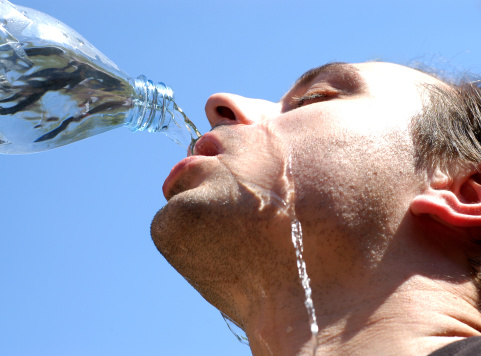

High Temperatures and Heart Attack Prevention
When your body is exposed to high temperatures it attempts to maintain a normal body temperature by dispersing heat, mainly in the form of sweating. Maintaining a normal body temperature, via sweating puts added stress on your heart because there is a decreased amount of blood. Your heart has to work harder to pump the decreased amount of blood through your body. If you suffer from heart disease, this added stress may increase your risk of suffering serious cardiac events, such as a heart attack.
Additionally, in extreme hot temperatures, your body may not be able to dissipate the heat and your body temperature may rise, resulting in hyperthermia. This, in combination with dehydration and electrolyte imbalance can result in heat-related illness. Heat-related illnesses include heat rash, heat cramps, heat exhaustion and heat stroke. If left untreated, heat stroke can be fatal. Cardiogenic shock can also occur when the body becomes over-heated. The heart becomes weak and cannot pump enough blood to the rest of the body. This can cause multi organ failure and can trigger a heart attack or can result in sudden cardiac death.
If you have heart disease you are probably taking some form of heart medication. Medications that are used to treat heart disease, especially beta-blockers, calcium channel blockers and diuretics, make it difficult for your body to disperse excess heat when the temperatures are scorching; this leaves you more vulnerable to heat-related illness. However, it is imperative that you do not stop taking your medication without discussing it with your doctor first as stopping medication may increase your risk of a serious cardiac event, including heart attack. Your doctor may be able to adjust your medication dosage during the hot summer months.
Heart Attacks are a Serious Matter – Protect Yourself
While everyone should takes steps to protect their heart during extreme hot weather, people suffering from heart disease should take extra precaution for heart attack prevention during extreme hot weather. The top heart attack prevention tip is to stay in a cool environment. If you have to be outdoors, choose areas that are shaded and avoid being outdoors during peak heat times (usually early afternoon). If you are exercising, opt to exercise indoors. Exercising outdoors during high temperature will create more heat than your body is able to dissipate. Additionally, since dehydration is common during high temperatures, be sure to stay hydrated. Drinking water and avoiding caffeinated beverages is a vital step for heart attack prevention.
In addition to the heart attack prevention steps that you should take to protect your heart during extreme hot weather, there are a number of other heart attack prevention measures that you should take, regardless of temperature, including:
1. Stopping smoking
2. Exercising regularly
3. Eating a healthy, nutritious diet
4. Maintaining a healthy weight
5. Controlling diabetes
6. Controlling high blood pressure
7. Managing stress
By following the general heart attack prevention steps above and by taking additional precautions during extreme hot weather, your chances of suffering a heart attack during a heat wave will be minimized.